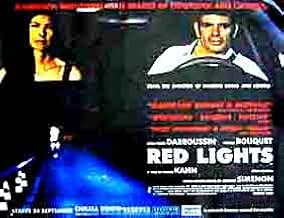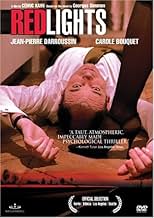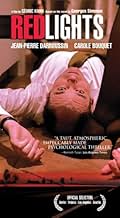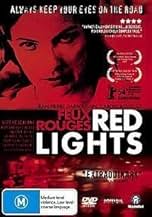IMDb RATING
6.6/10
3.2K
YOUR RATING
A cross-country trip turns out to be a nightmare for a troubled couple.A cross-country trip turns out to be a nightmare for a troubled couple.A cross-country trip turns out to be a nightmare for a troubled couple.
- Awards
- 2 nominations total
Featured reviews
8=G=
"Red Lights", a subtitled French film, spends it's 1.75 hour run following Antoine (Darroussin) and his wife Hélène (Bouquet) as they leave Paris for a night drive to Bordeaux to pick up their kids. What should have been an ordinary road trip turns into an extraordinary series of events which will leave the couple forever changed. The less you know about these events prior to viewing the better as any hint of what happens could lead to a case of mistaken genre and spoilage. This film is a human drama which doesn't attempt to entertain with extremes but rather opts to engross with a slowly seductive tale of intrigues kept to realistic proportion. "Red Lights" relies heavily on the ability to identify with the adult married couple and the problems they encounter and, therefor, will play best with mature adult audiences. A nicely managed, methodical and very believable film which spends most of its time with Darroussin, "Red Lights" received good marks from critics and public alike and is well worth a look by mature viewers into French flicks. (B+)
The first few seconds of 'Feux Rouges' show Antoine - a mid-age Parisian insurance agent - writing a loving mail to his wife on the verge of a family vacation. The last few seconds of the movie show the couple exchanging loving smiles while driving to the South where they would pick the children from a camp to continue together the vacation. Everything goes wrong in the in-between.
'Feux Rouges' starts as a relationship drama and turns into a thriller and a wrong-turn movie. It is inspired by a novel of the Georges Simenon, and as many of Simenon's novels the characters are far from being great communicators. The lack of communication, the routine and maybe the differences in social positions make of Antoine an unhappy husband who is ready to spoil the start of the vacations by heavy drinking while on road. Much of the movie happens on the road, and the gradual tension building picking with the disappearance of the wife Helen strikes a cord of uneasiness and even claustrophobia - great achievement for a film filmed on highways and roads with the sky almost permanently on view. As in many of Simenon's novels there is a moralistic twist, and justice is made even if it is completely the result of hazard and not of the will of men. And there is a huge price to pay for this justice, which we only can guess as it happens out of the screen and story time.
Director Cedric Kahn has learned a few lessons in thrillers from the great masters, and fist of all from Hitchcock. Antoine is wonderfully played by Jean-Pierre Darroussin as the type of character that we know from the very first moment that he will get into trouble and he indeed does all to confirm this, but it is the character of Helene played by Carole Bouquet that he relates to all the time and who is his focal point of frustration, worry and love.The simplicity of the story telling, the careful gradation of tension towards horror, the low key ending which does not solve the conflict, but just postpones it beyond the duration of the screening make of this film a worth watching piece of cinema.
'Feux Rouges' starts as a relationship drama and turns into a thriller and a wrong-turn movie. It is inspired by a novel of the Georges Simenon, and as many of Simenon's novels the characters are far from being great communicators. The lack of communication, the routine and maybe the differences in social positions make of Antoine an unhappy husband who is ready to spoil the start of the vacations by heavy drinking while on road. Much of the movie happens on the road, and the gradual tension building picking with the disappearance of the wife Helen strikes a cord of uneasiness and even claustrophobia - great achievement for a film filmed on highways and roads with the sky almost permanently on view. As in many of Simenon's novels there is a moralistic twist, and justice is made even if it is completely the result of hazard and not of the will of men. And there is a huge price to pay for this justice, which we only can guess as it happens out of the screen and story time.
Director Cedric Kahn has learned a few lessons in thrillers from the great masters, and fist of all from Hitchcock. Antoine is wonderfully played by Jean-Pierre Darroussin as the type of character that we know from the very first moment that he will get into trouble and he indeed does all to confirm this, but it is the character of Helene played by Carole Bouquet that he relates to all the time and who is his focal point of frustration, worry and love.The simplicity of the story telling, the careful gradation of tension towards horror, the low key ending which does not solve the conflict, but just postpones it beyond the duration of the screening make of this film a worth watching piece of cinema.
Red Lights is like a bad dream you might have if you nodded off over the wheel during a long car journey, with the roar of the motorway and the crunch of tyres on gravel seeping into your subconscious. It's so ambient, it would work just as well as a radio play. En route to collecting their kids from summer camp, 'married alive' couple Antoine (Pierre-Darroussin) and Helene (Bouquet) bicker in the car, as Antoine accuses her of cramping his style. The only way this sad little man can assert himself is to pull over and slug whisky after whisky in every roadside bar. When his furious wife bails out to catch the train instead, it's the start of one of those Long Dark Nights of the Soul for both parties. 'I got sick of playing the good little doggie', Antoine tells his mysterious hitchhiker, in one of the movie's most memorable exchanges. 'You're like my doggie,' sneers his passenger. 'Always thirsty.' 'Where's your dog?' 'He's dead
' Based on the Georges Simenon novel, here's a dark little number, blackly comic, and as searing as the red neon lights that accompany each pit stop on the road to Hell.
Opens with brilliantly shot sequences and if it then moves into more traditional French bourgeoisie territory it does it with passion and intelligence. As the narrative unfolds, involving a car drive that begins tetchy and proceeds to become really scary, we identify with the main protagonists and are as concerned as the male lead when the other disappears. A lot of the first part of the film is shot through the front screen of the car but this is so well done with the accompanying dialogue, developing tragedy and suspense we are almost on the edge of our seats. We lurch into nightmare territory and things become almost unbearable as we struggle to assure ourselves as to what is really happening. I was not as interested as the director in the relationship between the high flying wife and the husband who sees himself as her poodle and presumably this is why I found the ending simplistic and verging on the insulting, but never mind a good ride up to then!
Red Lights is a strange, abstract, almost existential exercise in movie making. Adapted from the 1953 novel by Georges Simenon and set to Debussy's elegantly creepy Nuages, writer-director Cedric Kahn offers up movie with attributes of a Hitchcockian suspense thriller.
The feeling of foreboding begins immediately when we meet Antoine Dunant (Jean-Pierre Darroussin a low-level insurance executive. He's just leaving his job to meet his beautiful wife Hélène (Carole Bouquet) in a local café. They are planning to drive to the countryside from Paris to pick up their kids from summer camp.
But as soon as Antoine gets to the café he guzzles three beers back to back with one eye on the street lest his wife arrive before he's suitably fortified. It soon becomes pretty obvious that their marriage is far from happy - Antoine armed with enough drink to sink an elephant, settles into a manner of truculent impetuosity, while Helene remains detached, cold, and almost abusive.
While in the road, Helen discovers that her husband is utterly plastered. She hardly says anything as he weaves all over the road, but her silence speaks volumes. Thus starts a trip of barely controlled hostility with the husband clenching the wheel and brooding, while the wife fumes beside him. Both are so busy bickering with each other and thinking dark thoughts that they're half oblivious to news reports of an escaped convict on the loose nearby.
Antoine isn't usually a drinker, but something has snapped in him, and as the neon signs of the roadside bars start to beckon him, he becomes obsessed with downing as much cold beer and whisky as he can. He leaves Helene angrily waiting in the car while he goes into yet another bar, to prepare himself for the long night ahead.
Hélène, freaked by his increasing belligerence and inability to drive in a straight line, abandons her husband to look for a train station. Meanwhile Antoine strikes up a conversation with a reserved one-armed stranger (Vincent Deniard).
When, minutes later, the stranger steps out of the parking-lot shadows, his face half hidden by the hood of a sweatshirt, and asks for a ride, the cocky, staggering Antoine doesn't even break stride. By now he's so sweaty and drunk that he waves the fellow right into the car.
What follows is detour into a night of terror for Antoine, Helene, and for the viewer. The movie starts to resemble everyone's nightmare - the inexplicable disappearance of a loved one. And as Antoine embarks on a desperate journey to track his wife down, it soon becomes clear that Red Lights is really showing us a portrait of a marriage, a marriage that has been enigmatically hanging by a thread.
Their need to see the children again is probably just a way of distracting them from the aridness of their relationship. She's beautiful and accomplished, while he plain and dull. Somehow the couple began their marriage as equals, but she soon eclipsed him, for which he can't forgive her. Other than this, Kahn provides very little reason as to why their relationship has suddenly gone sour.
What Kahn does provide, however, is the knowledge that marriage can often dissipate completely, leave two strangers in a car, totally sick of each other, in desperate need of a reviving shock to the system. But when the sun finally rises, and Antoine is released from his drunken hell, Kahn does provide a dash of hope for the couple.
In the end, Red Lights is showing that relationships are frail and that the machinations of marriage are often inexplicable. And if nothing else, Antoine and Helen show that it can all dramatically and irrevocably change and fall apart in a searing flash of red light. Mike Leonard September 05.
The feeling of foreboding begins immediately when we meet Antoine Dunant (Jean-Pierre Darroussin a low-level insurance executive. He's just leaving his job to meet his beautiful wife Hélène (Carole Bouquet) in a local café. They are planning to drive to the countryside from Paris to pick up their kids from summer camp.
But as soon as Antoine gets to the café he guzzles three beers back to back with one eye on the street lest his wife arrive before he's suitably fortified. It soon becomes pretty obvious that their marriage is far from happy - Antoine armed with enough drink to sink an elephant, settles into a manner of truculent impetuosity, while Helene remains detached, cold, and almost abusive.
While in the road, Helen discovers that her husband is utterly plastered. She hardly says anything as he weaves all over the road, but her silence speaks volumes. Thus starts a trip of barely controlled hostility with the husband clenching the wheel and brooding, while the wife fumes beside him. Both are so busy bickering with each other and thinking dark thoughts that they're half oblivious to news reports of an escaped convict on the loose nearby.
Antoine isn't usually a drinker, but something has snapped in him, and as the neon signs of the roadside bars start to beckon him, he becomes obsessed with downing as much cold beer and whisky as he can. He leaves Helene angrily waiting in the car while he goes into yet another bar, to prepare himself for the long night ahead.
Hélène, freaked by his increasing belligerence and inability to drive in a straight line, abandons her husband to look for a train station. Meanwhile Antoine strikes up a conversation with a reserved one-armed stranger (Vincent Deniard).
When, minutes later, the stranger steps out of the parking-lot shadows, his face half hidden by the hood of a sweatshirt, and asks for a ride, the cocky, staggering Antoine doesn't even break stride. By now he's so sweaty and drunk that he waves the fellow right into the car.
What follows is detour into a night of terror for Antoine, Helene, and for the viewer. The movie starts to resemble everyone's nightmare - the inexplicable disappearance of a loved one. And as Antoine embarks on a desperate journey to track his wife down, it soon becomes clear that Red Lights is really showing us a portrait of a marriage, a marriage that has been enigmatically hanging by a thread.
Their need to see the children again is probably just a way of distracting them from the aridness of their relationship. She's beautiful and accomplished, while he plain and dull. Somehow the couple began their marriage as equals, but she soon eclipsed him, for which he can't forgive her. Other than this, Kahn provides very little reason as to why their relationship has suddenly gone sour.
What Kahn does provide, however, is the knowledge that marriage can often dissipate completely, leave two strangers in a car, totally sick of each other, in desperate need of a reviving shock to the system. But when the sun finally rises, and Antoine is released from his drunken hell, Kahn does provide a dash of hope for the couple.
In the end, Red Lights is showing that relationships are frail and that the machinations of marriage are often inexplicable. And if nothing else, Antoine and Helen show that it can all dramatically and irrevocably change and fall apart in a searing flash of red light. Mike Leonard September 05.
Did you know
- GoofsAt the beginning of the movie, the main characters meet at a cafe in the late afternoon. They then go home and get ready to travel to Bordeaux to pick up their kids. On the trip to Bordeaux, they are stuck in heavy traffic. Although it is now early evening, the vertical shadows cast by the cars indicate that the traffic scenes were shot at mid-day.
- ConnectionsEdited into Le documentaire culturel: Le siècle de Simenon (2014)
- SoundtracksNuages
from "Nocturnes"
Written by Claude Debussy
Performed by Etienne Baudo and LOrchestre de l'Opéra national de Paris
Conducted by Manuel Rosenthal
- How long is Red Lights?Powered by Alexa
Details
- Release date
- Country of origin
- Official site
- Languages
- Also known as
- Kırmızı ışıklar
- Filming locations
- Cléré les Pins, France(The garage where Antoine has his tyre changed.)
- Production companies
- See more company credits at IMDbPro
Box office
- Gross US & Canada
- $673,828
- Opening weekend US & Canada
- $3,202
- Aug 22, 2004
- Gross worldwide
- $2,394,429
- Runtime
- 1h 45m(105 min)
- Color
- Sound mix
- Aspect ratio
- 1.85 : 1
Contribute to this page
Suggest an edit or add missing content


























